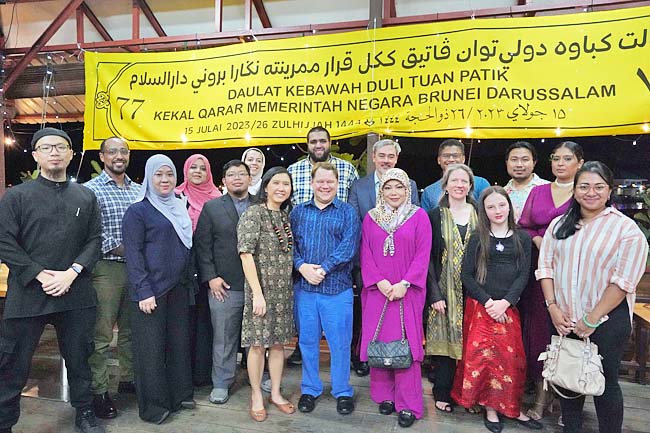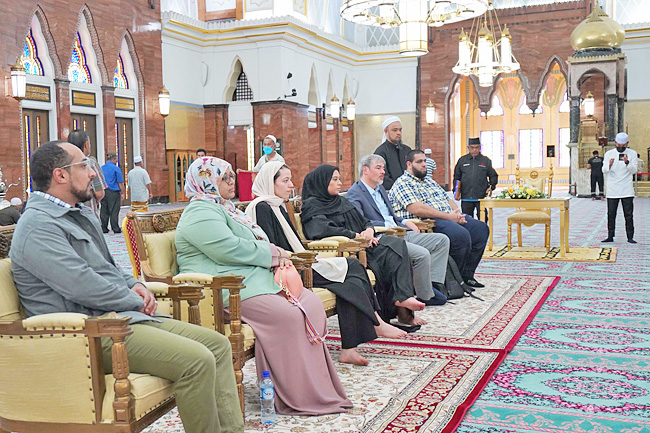Last week, Brunei hosted for the first time, a visit by the Australia-ASEAN Muslim Exchange Programme (AAMEP). Australia’s five AAMEP delegates were treated to world-class hospitality on their week-long programme.
AAMEP is an initiative of the Australian government launched in 2019 and is funded by Australia’s Department of Foreign Affairs and Trade. Delivered by a Melbourne-based consultancy comprising Australian Muslims, the AAMEP’s purpose is to promote friendship and linkages between Muslim communities in Australia and Southeast Asia.
Each of the five Australian AAMEP delegates who visited Brunei this month is an emerging Muslim leader in their fields: Kauthar Abdulalim is a filmmaker and producer; Mohammed Khelil a clean energy financier; Zinab Al Hilaly a mental health and multiculturalism advocate; Ameen Soliman an education and youth leader; and Anjum Kasmani a lawyer and women’s advocate.
The five Australian delegates’ visit to Brunei comes after a visit to Australia in June by the ASEAN delegates, who included two Bruneians – Rabiqah Natasha Halim binti Mohd Yusof and Awangku Md Nazirul Mubin bin Pengiran Haji Abdul Rahman – as well as delegates from Malaysia, Thailand and the Philippines. They join a growing number of Bruneian AAMEP alumni, after Brunei was included in AAMEP for the first time in 2022.
As these five future Australian leaders engaged with Bruneian government officials, religious leaders, universities, businesses and civil society organisations, they broke down stereotypes about what it means to be Australian.


Many people in Southeast Asia still believe, incorrectly, that Australia is a “White” country. In reality, we are one of the most diverse nations on Earth. Approximately half of all Australians were born overseas or have at least one parent who was (myself included), and more than 17 per cent of the population – almost five million Australians – are of Asian heritage.
The AAMEP visit also highlighted the important role that Islam plays in Australian society.
Islam has been present in Australia for hundreds of years, pre-dating European settlement.
It was first brought by Southeast Asians from Makassar, who regularly traded with Indigenous Yolngu people in what is now known as Australia’s Northern Territory. Then in the 1860s, Australia’s first mosques were built by Muslim cameleers from Afghanistan, who were invited to Australia to explore the inland regions and help draw our first maps.
Today, Australia is home to a vibrant community of over 800,000 Muslims – about twice as many as in Brunei.
They include two government ministers, one of whom, Minister Anne Azza Aly, who joined a dinner that Australian Prime Minister Anthony Albanese hosted for His Majesty Sultan Haji Hassanal Bolkiah Mu’izzaddin Waddaulah ibni Al-Marhum Sultan Haji Omar ‘Ali Saifuddien Sa’adul Khairi Waddien, Sultan and Yang Di-Pertuan of Brunei Darussalam, in Canberra last month.
One of the positive outcomes of this dinner was a discourse on the contributions of Australian Muslims in strengthening the Land Down Under through the sharing of diverse perspectives and their involvement in decision making.
Furthermore, with Muslims comprising over 40 per cent of the ASEAN’s entire population, Australian Muslims bridge the geographical divide between Australia with Southeast Asia, a region which is critical to Australia’s future stability and prosperity.
Building stronger people-to-people links and addressing misperceptions about Australia in Southeast Asia is a necessary precondition for deepening Australia’s engagement with ASEAN member countries across all fields – from trade and investment, to education and health, to defence and security.
Breaking down stereotypes is, of course, a two-way street. In addition to helping Bruneians to understand Australia as a modern multicultural country, it was clear to me throughout the visit that AAMEP was also helping these emerging Australian leaders understand the way Islam is practiced in Brunei.
Initiatives which build this kind of deeper mutual understanding are sorely needed in our world of increasing fake news and disinformation. We should support them as much as possible. – Australian High Commissioner to Brunei Darussalam Luke Arnold




